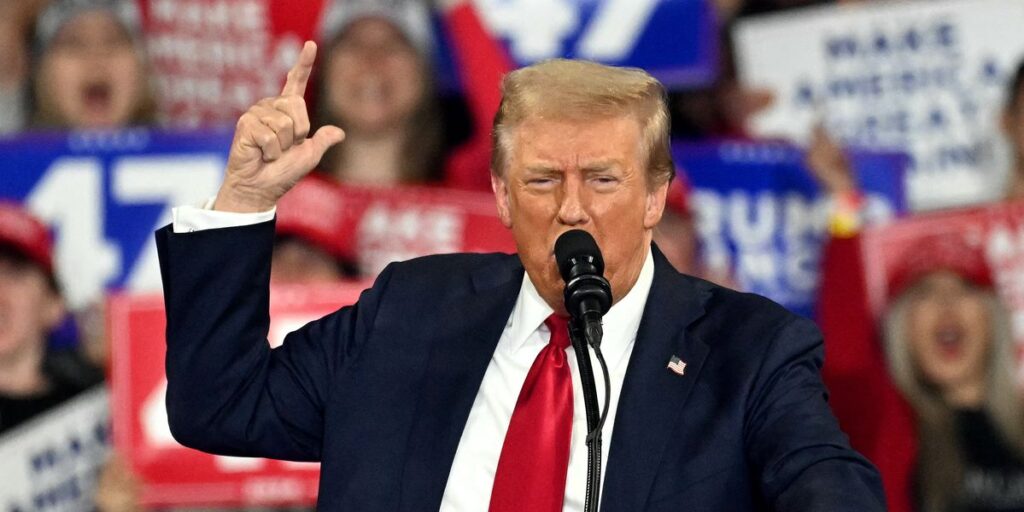In a particularly tumultuous week, former President Donald Trump unleashed an unprecedented barrage of offensive comments and racial rhetoric, reflecting both his unfiltered communication style and his controversial approach to the 2024 Republican presidential race. His diatribes included derogatory remarks aimed at women and immigrants, a dismissive commentary on Detroit—one of the largest majority-Black cities in the U.S.—and a series of misleading claims about federal disaster aid following severe hurricanes that affected several states. This cacophony of inflammatory remarks has been juxtaposed against an emergent political landscape in which Trump is statistically tied with Vice President Kamala Harris in pivotal battleground states, indicating a tight race as Election Day draws near.
At the start of the week, Trump propagated a false and xenophobic theory suggesting that immigrants possess a genetic predisposition toward criminality. He echoed this sentiment on conservative radio, mischaracterizing individuals with criminal backgrounds and attributing their actions to “bad genes.” This rhetoric is reminiscent of historical figures notorious for dehumanizing entire groups. Trump’s ongoing narrative about immigrants reflects long-standing themes in his political strategy, including hostile terminology and claims reminiscent of authoritarian regimes. Despite overwhelming evidence indicating that immigrants are statistically less likely than native-born citizens to commit crimes, Trump remains committed to igniting fear around immigrant communities.
His statements took on a bizarre tone during public engagements, notably during a speech at the Detroit Economic Club. Trump went off on tangents about everyday topics such as grocery prices, which he likened to complex and trivial subjects like paper clips, suggesting an odd connection between mundane economic issues and his tax proposals aimed at auto loan interest deductions. While he aimed to resonate with working-class families in Michigan, economic experts noted that most families would benefit more from standard deductions than the niche tax cuts he proposed. Furthermore, his derogatory remark about Detroit not only belittled the city but also implied a chilling vision of a Harris-ruled America, which many interpreted as disparaging the city’s largely Black population.
Trump’s confrontational stance extended to the media; he threatened news networks like CBS over their coverage of Harris and launched personal attacks on her coherent speech abilities while also deriding the women who host “The View.” This rhetoric appears particularly reckless, as it threatens to alienate women voters—an essential demographic for any Republican candidate. Coupled with previously established patterns of behavior, such as his controversial role in the Supreme Court’s decision to overturn Roe v. Wade, his comments only reinforce existing negative perceptions of him among female audiences.
Amid his tirades, Trump also spread misinformation regarding disaster relief efforts for victims of recent hurricanes, falsely asserting that federal agencies had run out of funds to assist impacted communities and that storm victims were limited to inadequate financial aid. These unfounded claims contributed to a wider narrative propagated by his supporters on social media, hinting at federal negligence in disaster response. In stark contrast, many Republican lawmakers publicly debunked Trump’s assertions, reinforcing the integrity of federal disaster relief processes. Trump’s manipulation of facts and catastrophic fallout amid a natural crisis sparked bipartisan criticism, even drawing commentary from former President Barack Obama, who rebuked Trump’s bullying tactics and misinformation.
The convergence of these outrageous remarks and misstatements underscores the broader tensions in American political discourse as the election approaches. Trump’s tendency to overwhelm with inflammatory rhetoric has polarized the electorate and deepened divisions within the Republican Party, as some party members grapple with the implications of his style on their campaigns. This week serves as a microcosm of Trump’s strategy, showcasing both his unrelenting attacks on perceived opponents and his ability to galvanize support despite widespread condemnation. Ultimately, the volatile political climate reinforces the challenge ahead for both Trump and Harris as they navigate a contentious road to the upcoming presidential election.

